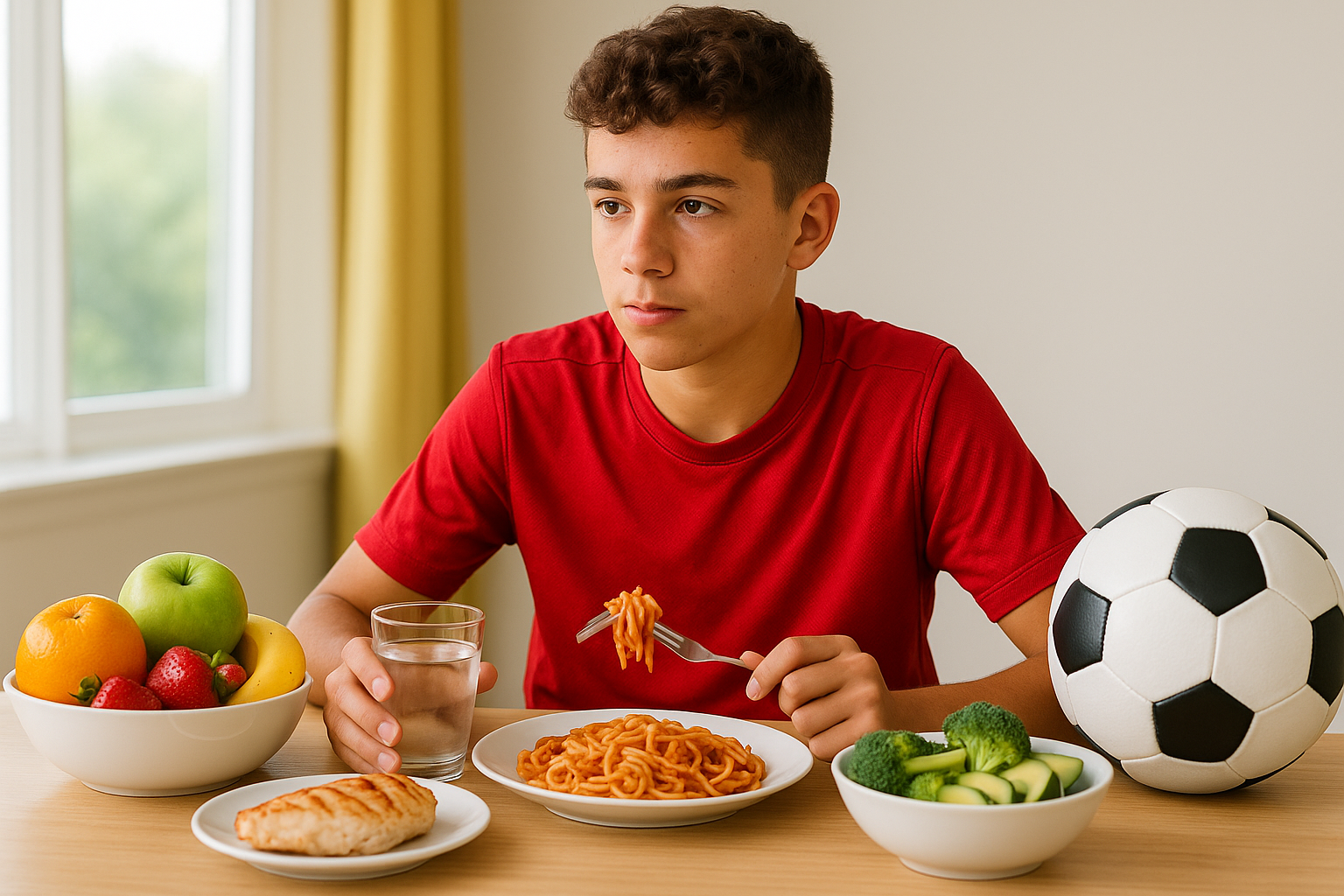Nutrition Tips For Young Footballers

Nutrition Tips For Young Footballers- Football (soccer) is one of the most physically demanding sports, requiring a mix of speed, endurance, agility, and strength. For young footballers, proper nutrition is not just about eating enough — it’s about eating smart to fuel training, support recovery, and promote healthy growth.
In this guide, we’ll break down the best nutrition tips for young footballers, covering pre-game meals, hydration, recovery foods, and long-term habits that help maximize performance both on and off the pitch.
1. The Importance of a Balanced Diet
A strong foundation for athletic performance comes from a balanced diet. For young footballers, this means including the right mix of:
-
Carbohydrates – the main fuel source for energy during matches and training.
-
Proteins – essential for muscle repair and growth.
-
Healthy fats – support brain function and joint health.
-
Vitamins and minerals – boost immunity, reduce fatigue, and aid recovery.
-
Hydration – water and electrolytes to prevent cramps and maintain stamina.
Balanced meals help young athletes stay energized throughout long training sessions and competitive matches.
2. Carbohydrates: The Fuel for Football
Football is a high-intensity sport with lots of running, sprinting, and quick turns. Carbohydrates (carbs) provide the quick energy that players need.
Best choices:
-
Whole grain bread, pasta, rice, oats
-
Sweet potatoes
-
Fruits like bananas, apples, berries
Tip: Before training or a match, focus on easily digestible carbs (like bananas or oatmeal) to avoid stomach discomfort.
3. Protein: Building Strength and Recovery
After a tough match or workout, muscles need repair. Protein provides the amino acids that help rebuild muscle fibers and keep players strong.
Good sources of protein:
-
Chicken, turkey, fish
-
Eggs and low-fat dairy (milk, yogurt, cheese)
-
Beans, lentils, and tofu for plant-based athletes
Tip: Aim to include protein at every meal to support recovery and growth.
4. Healthy Fats: Long-Lasting Energy
While carbs give quick energy, healthy fats provide slow-burning energy and support brain health, which is crucial for focus on the field.
Great options include:
-
Avocados
-
Nuts and seeds
-
Olive oil
-
Fatty fish like salmon
These should be eaten in moderation but are vital for long-term energy.
5. Hydration: Don’t Wait Until You’re Thirsty
Staying hydrated is often overlooked, yet dehydration can cause cramps, fatigue, and poor concentration.
Tips for footballers:
-
Drink water throughout the day, not just during games.
-
Before a match: drink 1–2 glasses of water.
-
During play: sip water every 15–20 minutes.
-
After: replenish fluids with water or natural electrolyte drinks (like coconut water).
Avoid too many sugary sodas or energy drinks — they can cause energy crashes.
6. Pre-Game Nutrition: What to Eat Before a Match
The meal before a match should provide energy without slowing you down.
Best pre-match foods (2–3 hours before):
-
Whole grain pasta with chicken and vegetables
-
Brown rice with grilled fish
-
A banana with peanut butter toast
Snack options (30–60 mins before):
-
A granola bar
-
A piece of fruit
-
Low-fat yogurt
7. Post-Game Recovery: Refuel and Repair
What players eat after a match is just as important as before. The body needs to refuel glycogen stores, repair muscles, and rehydrate.
Great recovery foods:
-
Chocolate milk (carbs + protein in one drink)
-
Grilled chicken wrap with veggies
-
Smoothies with fruit and protein powder
-
Rice and beans
Within 30–60 minutes after play, young footballers should aim for a carb + protein combo.
8. Vitamins and Minerals: The Hidden Heroes
Strong performance isn’t just about macros — micronutrients matter too:
-
Iron: carries oxygen in the blood (found in lean meats, spinach, beans).
-
Calcium: builds strong bones (milk, yogurt, fortified plant milks).
-
Vitamin D: supports bone and muscle function (sunlight, fortified foods, fatty fish).
-
Magnesium & Potassium: help prevent cramps (bananas, nuts, leafy greens).
9. Smart Snacking for Athletes
Snacks can keep energy levels steady between meals. Instead of junk food, young footballers should focus on:
-
Trail mix (nuts + dried fruit)
-
Greek yogurt with berries
-
Apple slices with peanut butter
-
Whole-grain crackers with cheese
These options provide both energy and nutrients to fuel busy training schedules.
10. Building Long-Term Healthy Habits
Young athletes should learn that nutrition is part of training. Coaches, parents, and players must work together to ensure food choices support both performance and health.
Key takeaways:
-
Plan meals around training schedules.
-
Prepare healthy snacks in advance.
-
Focus on whole, natural foods over processed ones.
-
Listen to the body — rest and recovery are just as important as training.
Conclusion
For young footballers, success on the pitch starts in the kitchen. By eating a balanced diet of carbs, protein, healthy fats, and micronutrients, staying hydrated, and planning smart pre- and post-match meals, athletes can maximize performance, reduce injuries, and build strong, healthy bodies for the future.
Nutrition is not a quick fix — it’s a long-term investment in athletic development. When paired with consistent training, the right diet helps young footballers unlock their full potential.

Comments are closed, but trackbacks and pingbacks are open.